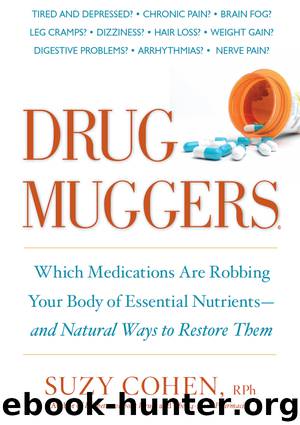Drug Muggers by Suzy Cohen

Author:Suzy Cohen
Language: eng
Format: epub
Publisher: Rodale
Published: 2011-11-08T05:00:00+00:00
15
Niacin (Vitamin B3)
Niacin was the third B vitamin to be discovered, so it’s often referred to as vitamin B3. It is best known for its ability to open blood vessels and capillaries wider. Capillaries are the tiniest blood vessels in your body; they supply your skin and hard-to-reach areas. Some capillaries are so narrow that blood cells have to flow through them in single file, like a procession. If they get clogged up over the years, they can completely close off. When niacin comes along and widens them, more blood flows. Health nerds like me call this process vasodilation. When it occurs, you turn pink, get a heat sensation everywhere, and feel all tingly.
The fact that niacin can widen arteries and increase blood circulation to such an extent means that it helps lower blood pressure and cholesterol while supplying more blood to the heart. In fact, studies confirm that niacin can help with all of these conditions and more.
The first statin cholesterol-lowering drug, lovastatin (Mevacor), was introduced to the American market in 1986. It made millions for its makers, of course, but the simple nutrient niacin has the ability to do the job at least as well and maybe better. And now I’m going to tell you something that just annoys the heck out of me, and I’m sure it’s going to upset you, too, especially if you have high cholesterol. As far back as 1994, doctors knew that niacin performed better than statin cholesterol drugs. They knew it!
In a small, head-to-head study published in the Archives of Internal Medicine that compared niacin with lovastatin, niacin outperformed the drug. In the randomized, placebo-controlled 26-week study, niacin raised the level of good cholesterol (HDL) by 33 percent compared to lovastatin’s measly 7 percent. What’s more, niacin was also shown to simultaneously lower levels of lipoprotein(a)—or Lp(a)—and fibrinogen, two substances that are strong risk factors for a heart attack. It lowered LDL (the bad kind of cholesterol) a little bit too. Lp(a) is really important. You won’t hear doctors talking about it much, but elevated Lp(a) can make you 10 times more likely to develop heart disease than high LDL, which everyone seems to obsess over.
So it looks like niacin actually does work harder than statins to protect your heart and circulatory system. That’s hard to believe, and I’m betting that most folks reading this book have never been told that niacin just might work better than a statin drug.
Niacin has the added benefit of reducing fibrinogen levels. Fibrinogen is a substance that makes blood thick and clotty, and high levels contribute to strokes. Best of all, niacin has the HDL-raising capabilities that statins can only dream of having.
So why isn’t niacin suggested more often for lowering cholesterol? For one thing, this nutrient can’t be patented in its natural form, so drug companies can’t make tons of money from it. Some smart cookies in the pharmaceutical world found a way to patent an extended-release formula that is sold by prescription. This drug
Download
This site does not store any files on its server. We only index and link to content provided by other sites. Please contact the content providers to delete copyright contents if any and email us, we'll remove relevant links or contents immediately.
Inner Engineering: A Yogi's Guide to Joy by Sadhguru(6796)
The Power of Now: A Guide to Spiritual Enlightenment by Eckhart Tolle(5782)
Fear by Osho(4740)
Ikigai by Héctor García & Francesc Miralles(4274)
The Art of Happiness by The Dalai Lama(4130)
The Ultimate Bodybuilding Cookbook by Kendall Lou Schmidt(3945)
Yoga Therapy by Mark Stephens(3749)
The Little Book of Hygge by Meik Wiking(3694)
The Healing Self by Deepak Chopra(3580)
Why Buddhism is True by Robert Wright(3453)
The Hatha Yoga Pradipika (Translated) by Svatmarama(3342)
Being Aware of Being Aware by Rupert Spira(3276)
Shift into Freedom by Loch Kelly(3199)
Wild Words from Wild Women by Stephens Autumn(3153)
Work Clean by Dan Charnas(3123)
Happiness by Matthieu Ricard(3049)
More Language of Letting Go: 366 New Daily Meditations by Melody Beattie(3030)
Yoga Body & Mind Handbook by Jasmine Tarkeshi(2880)
Why I Am Not a Feminist by Jessa Crispin(2760)
